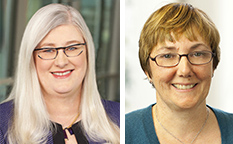Program evaluation leads to improved interventions, support for caregivers

With 40 million caregivers in the U.S., leaders at the Family Caregiving Institute at the Betty Irene Moore School of Nursing at UC Davis seek solutions for those providing care. That includes informing health care providers, systems and policy makers of the value that family caregivers bring.

Many caregiving programs are provided by service agencies, which lack the funding and expertise to conduct evidence-based research that determines the effectiveness of their interventions. The Institute’s program and policy evaluation unit, led by Heather M. Young and Janice Bell, brings decades of research expertise to the table. Through qualitative and quantitative methods, they assist agencies in understanding what in their organization works, what does not work and what the implications are for practice and policy.
Through this expertise, agencies can focus on designing and implementing programs that care for their constituencies, while institute researchers collect data to evaluate those programs.
Researchers bridge evidence from practice to policy. That evidence both enables agencies to better execute their mission and demonstrates to policy makers the case for funding.
Collaborations include:
- Contracted by the California Department of Aging to evaluate the seven licensed Adult Day Programs and Adult Day Health Care centers awarded grants for the California Community Program for Alzheimer's Services and Supports (Cal-COMPASS) Pilot Program.
- Awarded a three-year contract by the California Department of Aging to lead a project to support goal four of the California Master Plan for Aging: Caregiving that Works, focusing on improving equity and quality of services and supports for family caregivers.
- Leading evaluation for the Local Aging & Disability Action Planning (LADAP) Grant Program. This California Department of Aging program supports communities in planning for and addressing the needs of California’s older adults, people with disabilities, and professional and family caregivers of today and tomorrow.
- Awarded contract by Snowline Hospice of El Dorado County on a grant from the Administration for Community Living’s Alzheimer’s Disease Programs Initiatives – State and Community Grants initiative. The goal of the three-year project is to improve the early detection of dementia in El Dorado County, including an evaluation of a current campaign and collaboration with community health partners and organizations including those serving individuals with Intellectual/Developmental Disabilities.
- Collaborated with local and national advocacy organizations to develop recommendations for in-home services and supports to address unmet needs of individuals with Amyotrophic Lateral Sclerosis (ALS), a rare progressive neurodegenerative disease with profound impact on quality of life of the individual and their family caregivers. The team completed a series of focus groups with health professionals and interviews with caregivers to gain a better understanding of the service needs and experiences of those providing care to or supporting individuals with ALS.
- The institute remains committed to supporting the efforts of the 11 California Caregiver Resource Centers (CCRC) across the state through the transformative initiative, "Picking up the Pace of Change: Scaling Services for a Changing Caregiver Profile." Under a contract with the Family Caregiver Alliance, the institute spearheads a comprehensive mixed methods evaluation to assess the impact of the statewide implementation of the CareNav™ program, a technology enabled approach to support family caregivers. Funded by the California Department of Aging, this evaluation aims to provide valuable insights into the effectiveness of the program, ensuring that it aligns with the evolving needs of family caregivers and to enhanced and equitable caregiver services statewide.
- Supported by The SCAN Foundation, we are developing a toolkit to assist rural leaders in creating local Multisector Plans for Aging (MPA), building on previous work (2022-2023) aiding seven rural counties in California with local MPA development.

